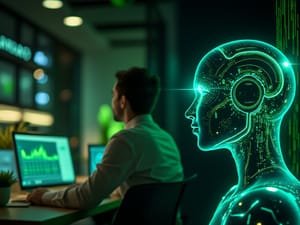Fifteen years in the tech industry seemed like I would have seen it all. The dot-com boom and fall, the growth in social media, and the mobile revolution. Nothing, though, really matches the AI explosion we are currently seeing. Artificial intelligence is the sole topic everybody appears to be discussing in 2024; it is not merely the next great thing.
The Investment Paradise
Allow me to sketch you a picture. In just one year, tech behemoths and VCs pump over $200 billion into artificial intelligence. There is not a misprint in that. Two hundred billion dollars. Pitch meetings where startups with hardly more than an idea and "AI" in their name have left with eight-figure fundraising rounds have seen me seated.
The emphasis lies on Everything from business solutions claiming to automate whole departments out of existence to healthcare artificial intelligence capable of diagnosing diseases before symptoms start. For those of us who experienced past tech bubbles, it is fascinating, certainly, but it also feels like déjà vu.
The Revolution in Infrastructure
Still, it goes beyond ideas and software. Before our eyes, Silicon Valley's physical landscape, as well as tech hotspots around the globe, is changing faster than I can keep track of, and data centers are springing up. An energy industry friend informed me that utility companies are having nightmares over the demand for electricity from these artificial intelligence farms.
I visited a recently built data center just last week. The scope was astonishing: Row after row of servers, all committed to preparing the next wave of artificial intelligence models. The heat these objects produce could warm a small community. It made me consider whether we really understand the effects of our artificial intelligence aspirations on the environment.
The Riddle of Returns on Investment
Things get complicated here. Where's the money? This remains a persistent concern despite all this investment, brilliant demos, and astounding benchmarks.
Not to misinterpret, there is obvious potential. Potential, though, cannot pay the bills. Investors and business clients are becoming increasingly annoyed. Although they bought into the artificial intelligence hoopla, now they expect concrete, bottom-line-impacting results.
One could clearly feel this change. The days of lavishing money on any artificial intelligence initiative are running short. The challenging questions are being posed now: How can one become profitable? In what way does this AI approach address practical issues? People, the honeymoon phase is ending.
Innovation against Hyperspace
Separating the wheat from the chaff presents one of my most challenging difficulties. Every innovative AI application seems to have twelve 'AI-powered' solutions, barely more than clever marketing for traditional technology. These could be chatbots that are marketed as AI assistants but are actually rule-based systems, or image recognition software that claims to be AI but is based on traditional algorithms.
Let's not, however, toss the baby with the bathwater. The developments I have witnessed in disciplines like natural language processing and computer vision are amazing. However, some of the most fascinating uses are quietly transforming manufacturing techniques, energy networks, and scientific research. They are not generating news.
The Race for Global Artificial Intelligence
The rest of the world is not standing still while we are navel-gazing in Silicon Valley. I have been on many trips lately, and the scene of artificial intelligence worldwide is intriguing. Europe is approaching things more deliberately, emphasizing ethical artificial intelligence and valuable uses. Particularly in China, Asia is all-in on artificial intelligence hardware and mass application.
This worldwide competitiveness still gives the AI race another degree of complexity and urgency. Nowadays, it's not only about business; it's also about worldwide technical leadership.
The Road Ahead: Prospect and Hazards
Where do we then find ourselves? On the one hand, artificial intelligence has unquestionable potential. The optimist in me sees a bright future, a technological revolution surpassing all we have seen thus far. The potential of AI to transform our world is truly inspiring. However, the scars from past tech bubbles make me cautious.
The difficulties are really important. We are debating ethical issues, environmental effects, and the very real likelihood of job dislocation. Not to mention the elephant in the room—the existential concerns emerging artificial intelligence raises. These include the potential for AI to surpass human intelligence, the ethical implications of creating conscious AI, and the impact on human identity and purpose if AI takes over many of our current tasks.
Here at this junction, I think we should do a couple of things:
- Emphasize practical, value-driven artificial intelligence applications.
- To equip our workers, fund AI education and reskilling initiatives.
- Create strong ethical rules and legal structures for artificial intelligence evolution.
- Balance our fixation on ongoing expenditure on other vital technologies with our AI obsession.
- Encourage worldwide AI research and development collaboration.
The Last Word
Make no mistake; the revolution in artificial intelligence is here. But whether it lives up to the trillion-dollar bets being placed on it rests on us—on the decisions we make, the priorities we set, and the values we respect. These 'trillion-dollar bets' refer to the massive investments being made by tech giants, venture capitalists, and governments in AI research, development, and deployment.
Having ridden the technology roller coaster for almost fifteen years, I am eager but wary. Artificial intelligence has great power to address some of humanity's most urgent problems. But if we act carelessly, the hazards follow.
One thing is sure: the next few years will define whether our extensive investment in artificial intelligence pays off or whether we are building the most costly digital castles in the cloud. Still, it will be one heck of a ride.
How do you view this artificial intelligence gold rush? Do we need a reality check? Are we headed in the right direction? I want your opinions. Let's keep this discussion going since we are stakeholders in the AI-driven future we are creating.

